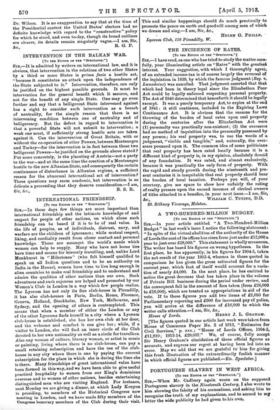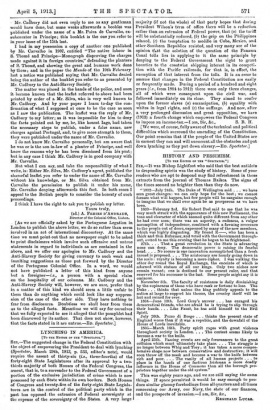PORTUGUESE SLAVERY IN WEST AFRICA. [To THE EDITOR OF THE
" SPECTATOR."] SIR,—When Mr. Cadbury again wrote on the supposed Portuguese slavery in the Nineteenth Century, I also wrote to him showing the falsity of his accusations, and asking him to recognize the truth of my explanations, and to accord to my letter the wide publicity he had given to his own.
• Mr. Cahury did not even reply to me as any gentleman would have done, but some weeks afterwards a booklet was published under the name of a Mr. Paiva de Carvalho, ex- subcurator in Principe; this booklet is the one you refer to in your issue of the 15th last.
I bad in my possession a copy of another one published by Mr. Carvalho in 1907, entitled "The native labour in S. Thome and Principe—Monograph disproving the charges made against it in foreign countries," defending the planters of S. Thome, and showing the great and humane work done by them ; and in the paper the Hand° of the 10th February last a notice was published saying that Mr. Carvalho denied being the author of the booklet you refer to as presented by Mr. Cadbury to the Anti-Slavery Society.
The matter was placed in the hands of the police, and soon it became known that the leaflet referred to above had been printed by order of a Mr. Silva, who is very well known to Mr. Cadbury. And by your paper I learn to-day the con- firmation of what I supposed at once to be the case as soon as I saw the publication. The leaflet was the reply of Mr. Cadbury to my letter; as it was impossible for him to deny the facts pointed out by me, be, like honest Iago, had taken the necessary steps to publish, under a false name, new charges against Portugal, and, to give more strength to them, they were published under the name of Mr. Carvalho.
I do not know Mr. Carvalho personally, but am aware that he was or is the son in-law of a planter of Principe, and well know the reasons why he has been dismissed from his post ; but in any case I think Mr. Cadbury is in good company with Mr. Carvalho.
But what I can say, and take the responsibility of what I write, is: Either Mr. Silva, Mr. Cadbury's agent, published the shameful leaflet you refer to under the name of Mr. Carvalho without his knowledge, or Mr. Silva obtained from Mr. Carvalho the permission to publish it under his name, Mr. Carvalho denying afterwards this fact. In both cases I appeal to the British people to consider the honesty of such proceedings.
I think I have the right to ask you to publish my letter. Yours truly, (sd.) A. FREIRE D'ANDRADE, Director of the Colonial Office, Lisbon. [As we are officially asked by the Portuguese Legation in London to publish the above letter, we do so rather than seem involved in an act of international discourtesy. At the same time we must point out that no newspaper ought to be asked to print disclaimers which involve such offensive and untrue statements in regard to individuals as are contained in the above, and we offer our apologies to Mr. Cadbury and the Anti-Slavery Society for giving currency to such weak and insulting suggestions as those put forward by the Director of the Portuguese Colonial Office. In a word, we would not have published a letter of this kind from anyone but a foreigner—i.e., a person with a special claim on the hospitality of our columns. Mr. Cadbury and the Anti-Slavery Society will, however, we are sure, prefer that in a matter of this kind we should seem a little unfair to them than do anything which could look like any suppres- sion of the case of the other side. They have nothing to fear from disclosures. Doubtless we shall hear from them as to the alleged facts. Meantime we will say for ourselves that we fully expected to see it alleged that the pamphlet had been disavowed by its author. That does not show, however, that the facts stated in it are untrue.—!En. Spectator.]















































 Previous page
Previous page